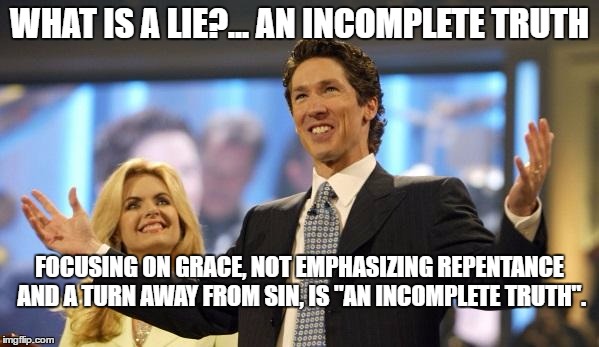
How do you explain the persistence of suffering? It might be easier to say to someone undergoing a divorce that there is something redemptive about the lessons they learned, but what about a child with cancer? This week, the prosperity gospel came face-to-face with its own theological limits. Its central claim - "Everyone can be prosperous!"-contains its own conundrum. For many Christians, in particular, the prosperity gospel has an unpopular answer to the problem of evil in the world. When a church that places enormous theological weight on tithes and offerings is not a leader in charitable giving, the most obvious question is about who is the primary beneficiary of the prosperity gospel? The everyman or the man at the front? There is a lingering controversy around prosperity megachurches and their charitable giving. When the floodwaters rise, no one wants to see him float by on his yacht, as evidenced by the Christian satire website the Babylon Bee's shot Tuesday at Osteen: "Joel Osteen Sails Luxury Yacht Through Flooded Houston To Pass Out Copies Of 'Your Best Life Now.' " But the inequality that makes Osteen an inspiration is also what makes him an uncomfortable representation of the deep chasms in the land of opportunity between the haves and the have-nots. For that reason, churchgoers love to see their preachers thrive as living embodiments of their own message. The promise of the prosperity gospel is that it has found a formula that guarantees that God always blesses the righteous with health, wealth and happiness. He is a wealthy man who unapologetically preaches that God has blessed him, with the added bonus that God can bless anyone else, too.


From aerial views of his jaw-dropping mansion to the cut of his navy suits, he always looks like a man with a good reason to be smiling. Joel Osteen represents the Christian 1 percent. It does.īut there are three main reasons long after this controversy passes, Joel Osteen will still be the preacher America loves to hate - and perhaps for Christians more than others. And, for those who don't mind waiting a few minutes after the service, he will shake your hand and tolerate your comment about how his hair looks even better in real life.


He is the cheery advertisement for the 606,000-square-foot Lakewood Church and, with the gorgeous Victoria by his side, tours the country in packed-out arenas to bring "A Night of Hope" - a religion-lite, inspirational speech set to music. I've been studying the American prosperity gospel for more than a decade, and I have come to the stunning conclusion that Joel Osteen seems to be a pretty nice guy. So what is it about America's grinning preacher that everyone hates so much? In fairness, the city of Houston has more megachurches than any other metropolitan area in the country, with dozens of big-church celebrities to thrust into the spotlight at a time like this. With his yachts and jets and endlessly-smiling mouth offering promises of "Your Best Life Now" (that's the name of his best-selling book), Osteen was already a subject of contempt among Americans, in general.īut in the past few days he has been lambasted as being, at best, sluggish in providing emergency aid to those suffering from the disaster and, at worst, a hypocrite who cares more about people's wealth than welfare. The question over whether Osteen's 38,000-member Lakewood Church has sufficiently aided in the disaster relief effort in the wake of Hurricane Harvey has, once again, made America's prince of the prosperity gospel into an object of social media contempt. "Twitter is loathing Houston's megawatt-smile, mega-pastor Joel Osteen right now.


 0 kommentar(er)
0 kommentar(er)
